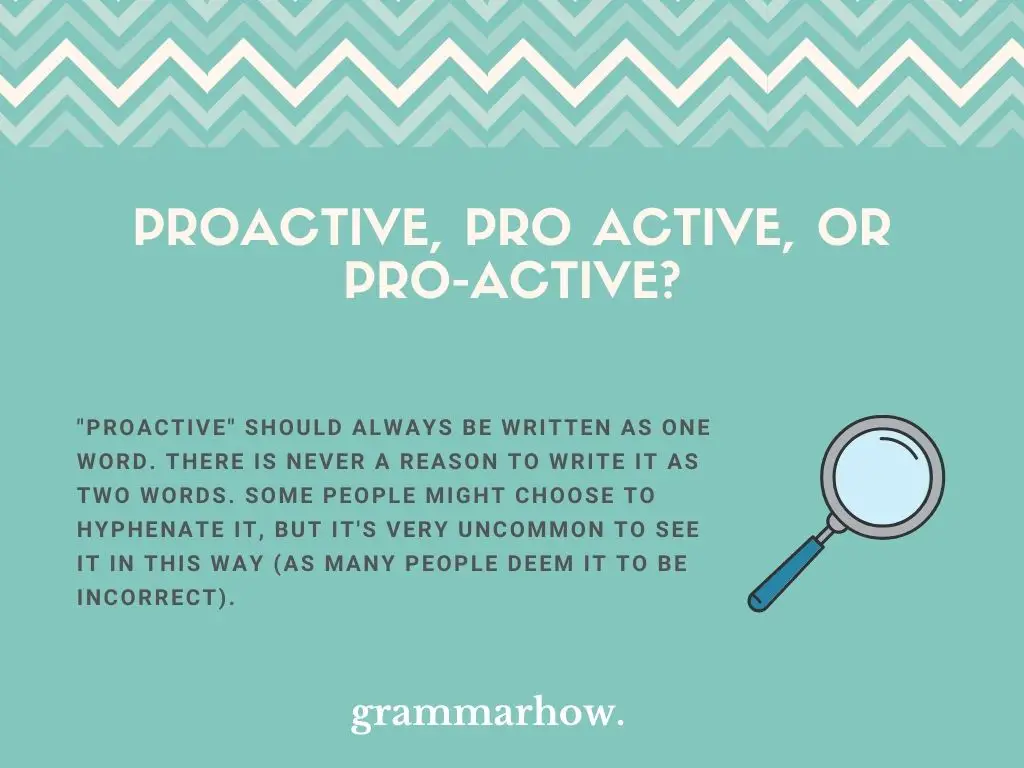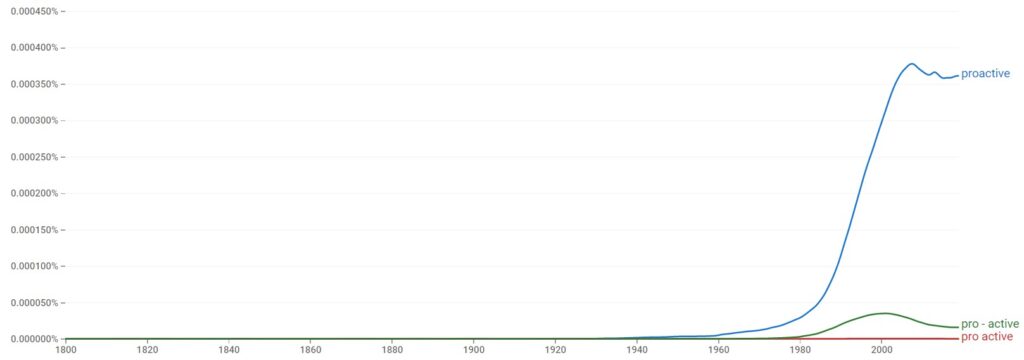Being “proactive” is a very desirable trait, especially in a workplace. While spelling the word might seem easy, it would still help to know whether it’s one or two words. It might work as a hyphenated form, but this article will help you to understand the correct forms.
Pro active vs. Pro-active vs. Proactive
“Proactive” should always be written as one word. There is never a reason to write it as two words. Some people might choose to hyphenate it, but it’s very uncommon to see it in this way (as many people deem it to be incorrect).

According to Google Ngram Viewer, “proactive” is the only acceptable form of the three. You can see that it’s vastly more popular, making it the best choice in all written forms.

The Cambridge Dictionary and The Oxford Dictionary note that “proactive” should be written in the grouped form. We can use it in this way because “pro” is a prefix that works to modify “active.”
Interestingly, The Cambridge Dictionary does briefly mention “pro-active” as an alternative spelling but does not provide any examples or touch on it for more than a brief moment. Therefore, it can be used, but it’s very uncommon (and often avoided by native speakers).
Is “Proactive” One Word?
“Proactive” should always be written as one word. “Pro-” is a prefix, and we use it with the root word “active” in this case. It means that someone is always looking for more tasks to complete and stay active. Prefixes always get grouped with root words.
Some other “pro-” prefix words that help to prove this idea are:
- Proceed
- Protest
- Project
- Professional
- Proceed
Here are a couple of examples to help you figure it out:
- You’re the most proactive person on this team! Would you like to help the others be more like you?
- Being proactive is a gift from my parents! I love the way they taught me how to work.
- I like seeing the proactive workers in action! They’ll always find work that no one else seems interested in.
- I’m not the most proactive person, but I still try my best when I get the chance!
Is “Pro active” Two Words?
“Pro active” should never be split into two words. “Pro” is a prefix when used with the word “active,” so it makes no sense to include it in a way that means it’s a separate word. Always make sure to write it as a singular word when using it.
Here are some examples that should make it clear:
- Correct: If you need any advice on being more proactive, I’m here to help you!
- Incorrect: Don’t worry; you’re not the only pro active sort on this team!
- Correct: I’m a very proactive person, which is why I’m always the first to get my work done.
- Incorrect: I love pro active people. They are so much better at working than most others!
Is “Pro-active” Hyphenated?
“Pro-active” is not correct when hyphenated. We do not write it in this way because “pro” is not an officially recognized word when used in this context. Instead, it’s a prefix, meaning that it should connect to the root word “active” without needing a hyphen.
Typically, the AP Stylebook will teach us that adjectives made of more than one word should be hyphenated. However, since “pro-” is a prefix, we do not typically follow the AP Style rules. Some people like to use it, but it’s not appropriate in most cases.
These examples should help you understand the correct form:
- Correct: I’m not proactive enough to get this work done when there’s nobody shouting at me.
- Incorrect: Being pro-active is very important to me, and I need to see it from my colleagues.
- Correct: Your proactive attitude is more than enough for us to keep working at this rate!
- Incorrect: I don’t have a pro-active bone in my body! Sorry, I can’t be more helpful!
Is “Active” Capitalized In The Word “Pro-Active”?
Since “pro-active” is not grammatically correct, we do not need to worry about capitalization with it. However, you might find that “proactive” needs to be capitalized in some cases.
The only time you capitalize “proactive” is when it starts a sentence, or it’s in a title. Any other time it stays lower-case because it’s not a proper noun.
